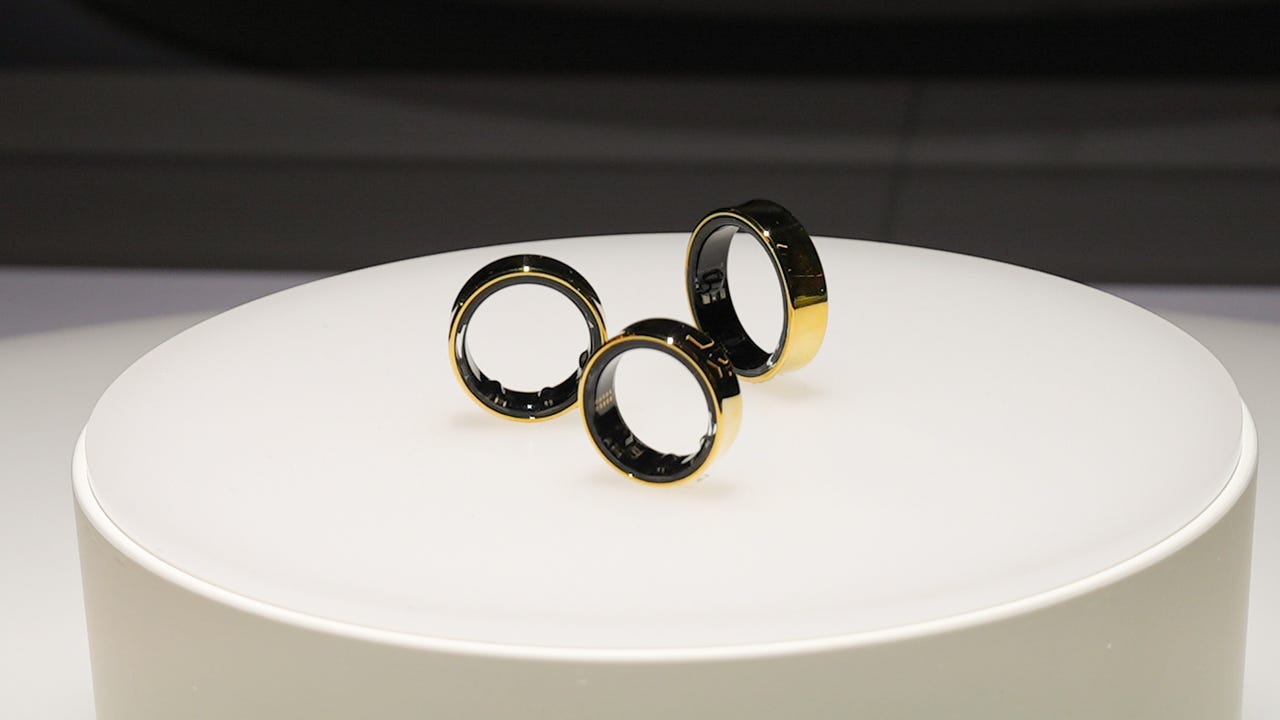I tried the Samsung Galaxy Ring and it beats the Oura in 2 meaningful ways

Unless Samsung finally takes the wraps off of its long-rumored VR headset this year, I'm finding it more and more likely that the Galaxy Ring, announced at Unpacked in January, will be the company's biggest product of 2024.
Also: Best gadgets I saw at MWC 2024: Smart rings, concept phones, transparent laptops
Ahead of MWC, in a meeting room just a few blocks away from the Fira de Barcelona, I sat down for an intimate roundtable discussion with the company's Vice President and Head of Digital Health Team, MX Experience, Hon Pak, to talk all things Galaxy Ring. Well, all things that Dr. Pak was allowed to talk about.
That included the reason why the company is throwing its hat into the ring market, details on the Galaxy Ring's fit and finishes, why and how it'll co-exist with Samsung's other health-tracking wearables, and more. I also went hands-on with Galaxy Ring prototypes that I'm told were not final but close to it.
If you've been following the development of the Galaxy Ring, you'll know that Samsung is promoting it alongside its updated Samsung Health platform in hopes of centralizing the various metrics and health data collected by today's smart devices and wearables to provide holistic, approachable action plans. "There are over 64 million monthly Samsung Health active users," Dr. Pak shares proudly, so this isn't a matter of a solution looking for a problem; it's warranted.
One key way that the Galaxy Ring will be able to help its users is with a My Vitality Score, similar to Readiness scores on the Oura Ring and Body Battery on Garmin watches. By tracking your sleep health, activity, resting heart rate, and heart rate variability, My Vitality Score gives users a clear understanding of their physical readiness and mental preparedness. To clarify, that score is aided with "Booster Cards" that give advice and action items that guide users to healthier behaviors.
Dr. Pak also believes in building the wearable with women's health in mind, citing Samsung's partnership last year with Natural Cycles that brought skin temperature and fertility tracking to the Galaxy Watch. That same FDA-cleared technology will be present on the Ring.
Also: RingConn takes on Oura with its impressive subscription-free smart ring
So, how will Samsung be delivering on these promises? Through a ring that will likely be available in three colors (black, silver, and gold) and nine sizes (from 5 to 13), based on the samples at the briefing. The sizing wasn't identical to the ones for the Oura Ring, as several other journalists in the room immediately noticed as they grabbed what they expected to be the right fit, only to realize they were a size larger. Again, these were prototypes.
Samsung is showcasing the Galaxy Ring at MWC 2024.
When worn, the Galaxy Ring was as lightweight and minimal as I expected, feeling burdenless compared to the bulkier smartwatch I also had on. That's not to say that you won't feel it when you press your fingers together or accidentally sit on your hand (just me?). The silver and gold variants were noticeably more shimmery than the black, so if you want your smart ring to be discrete, then go with black and only black.
Even if Samsung won't admit that it wants to overtake Oura with the Galaxy Ring -- Dr. Pak says that the primary reason for the venture is to serve users who have been asking for more fitness wearable options -- there's no question that the Galaxy Ring will compete directly against the market leader in a meaningful way.
Also: Sorry, Oura and Samsung: Apple Ring reportedly 'imminent'
In two regards, Samsung has the upper hand. First, the outer part of the Galaxy Ring has an inward dip that, while subtle, should make the accessory easier to wear even when a user experiences bloated fingers, I'm told. And if the Galaxy Ring really does work as harmoniously within the Android ecosystem as Samsung claims, then it will be the go-to option for millions of users worldwide.
With the Galaxy Ring, Samsung wants you to look at the big picture. Beyond being a simplified health tracker -- which just so happens to go against today's trend of companies making wearables more and more complicated -- the Galaxy Ring is intended to help kickstart your productivity and well-being, working in tandem with surrounding Samsung/Android devices, and possibly products from Apple in the future.
Of course, several questions remain, including what products/product categories will surround the Galaxy Ring, how durable it is, and how much it costs (and will there be a subscription)? We'll likely find out later this year, possibly as soon as July or August, when Samsung typically hosts its summer Unpacked event.
